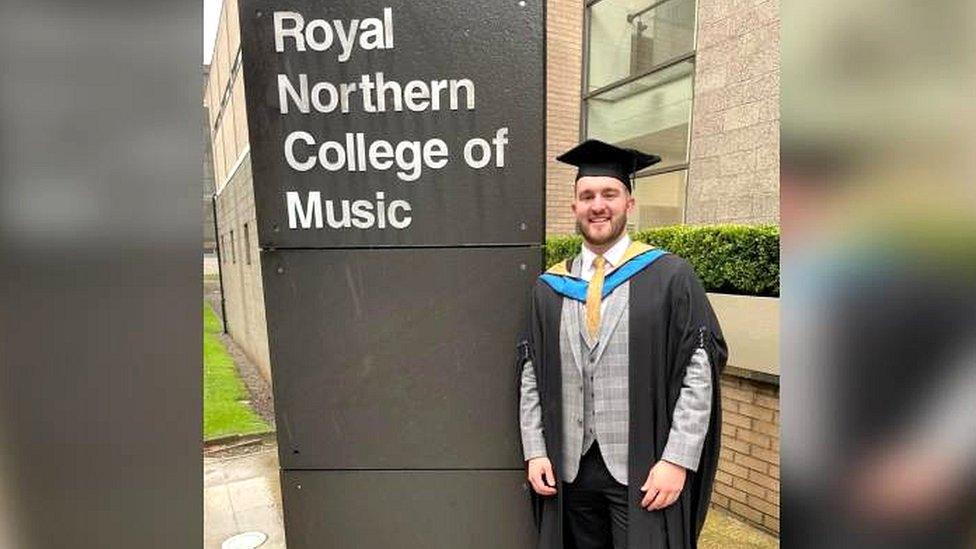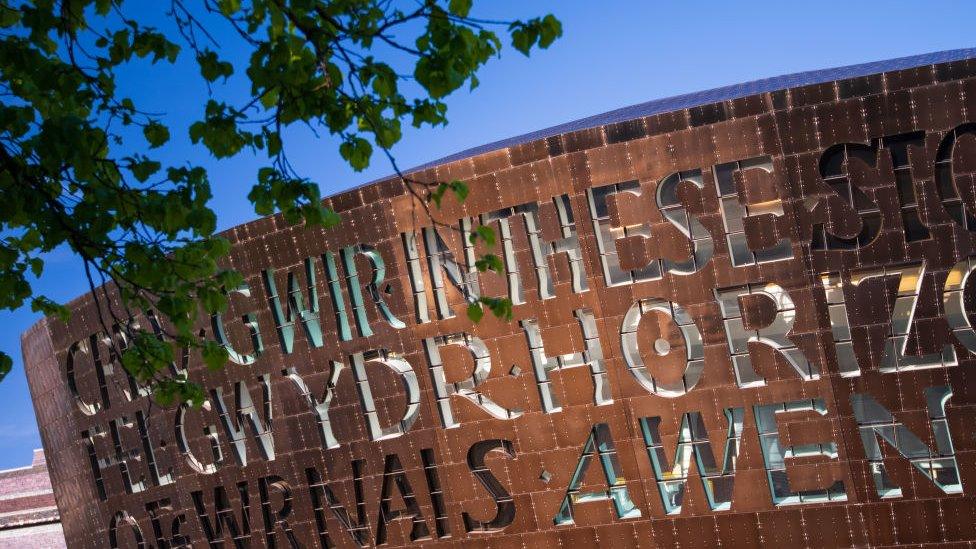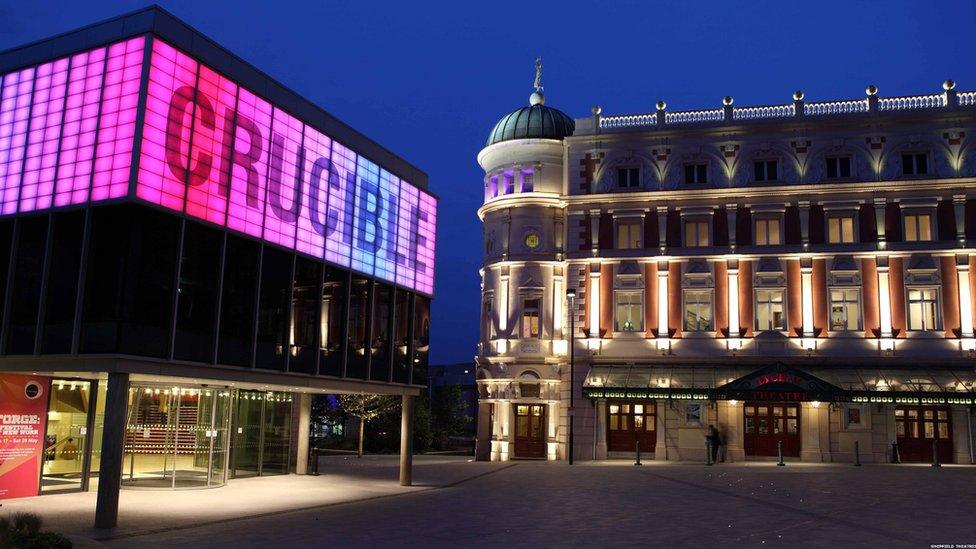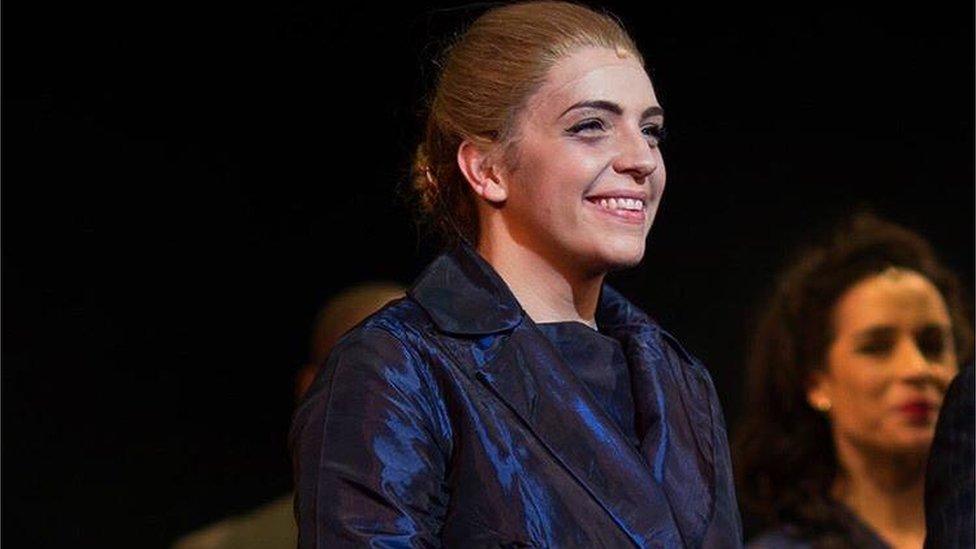Covid: Freelancers in the arts sector still uncertain of future
- Published

Steffan Lloyd Owen said he has been thinking about a career change since the pandemic hit
Wales should trial a basic income scheme for freelancers in the arts, according to a group that supports the sector.
Cultural Freelancers Wales claims one in four short term contract workers feels uncertain about their future.
One idea suggested is to introduce a guaranteed income scheme, similar to one used in Ireland.
The Welsh government said it has already provided £108m of support for the arts during the Covid pandemic.
Opera singer Steffan Lloyd Owen from Pentre Berw on Anglesey, was about to graduate from the Royal Northern College of Music in Manchester when the pandemic hit.
Although lockdowns affected everyone in the performing arts world, he feels people beginning their journey in the industry, were left behind when things started to reopen.
"There were no opportunities at all, and the things that would have been there if the pandemic hadn't hit, suddenly weren't," he said.
"I was a little bit in denial, thinking 'it will come eventually', but it never did," he said.

Steffan graduated before the pandemic hits and wasn't able to perform
'Once in a lifetime'
Pandemic circumstances meant cancelling shows, including a chance to perform with Sir Bryn Terfel - opportunities Steffan admits may only come "once in a lifetime".
He now works in the construction industry with his father to secure steady income.
"I'd be lying if I said I hadn't thought about a change of career," he admits.
"I've been looking at other things, things I never thought I'd be doing if the pandemic hadn't happened - I certainly didn't think I would be building walls.
"But I do have some singing work coming up, so I'm hoping that snowballs into more work in the future."
'Greater support'
According to Cultural Freelancers Wales, there are around 8,500 freelance workers in Wales.
Its latest report claims half of those had lost 80% of their work during the pandemic, with 91% forced to turn to support schemes such as furlough and other grants.
Although the situation has improved, incomes were still 59% lower on average than they were before the pandemic, with a quarter of respondents unsure whether they had a future in the industry.
The report recommends greater support from the Welsh government and the Arts Council for Wales, as well as improving diversity and distributing money more equally across Wales.
It also calls for the Welsh government to trial a Universal Basic Income-style scheme.
Actor and director Steffan Donnelly is one of the report authors and said: "This is a way of considering how we can have some kind of baseline, which means that freelancers also have more freedom to work within their communities.
"I think it would be interesting to see now, with so much talk about this, how we can adapt these kind of ideas in our sector," he added.
But Conservative MS Tom Giffard, believes such schemes are ineffective: "We know where this has been tried across the world, that this does not lead to people going in to work.
"So what we want to see is that as we come out of the pandemic, that more and more people go to watch performances and shows and the like - that's the way to secure a better financial future for the industry," he said.

The Welsh government is working on a freelancer pledge to help those in the creative sector
'Freelancer pledge'
In their response to the report, the Welsh Government said it had "established a dedicated fund to support freelancers" and that their Cultural Recovery Fund had "provided more than £108m to support the wider sector during the pandemic".
It added: "We are working on a Freelancer Pledge - a UK-first - this will reaffirm our commitment to involving the creative sector in helping Wales recover from the Covid pandemic.
"This presents an opportunity for creative freelancers and public services to forge a partnership, and for freelancers to use their skills to bring creativity and imagination to all areas of public life."
The Arts Council for Wales welcomed the "impressive and comprehensive" report, and said: "The important thing for us as an Arts Council is to now identify ways of working together in order to find the most appropriate and effective ways to address the report's recommendations."

THE STORY OF MIWSIG: Eleri Price and Huw Stephens time travel with Welsh language pop
MARGINS TO MAINSTREAM: Michael Sheen introduces new writers revealing their truths

- Published17 November 2021

- Published30 July 2020

- Published28 July 2020

- Published17 July 2020
